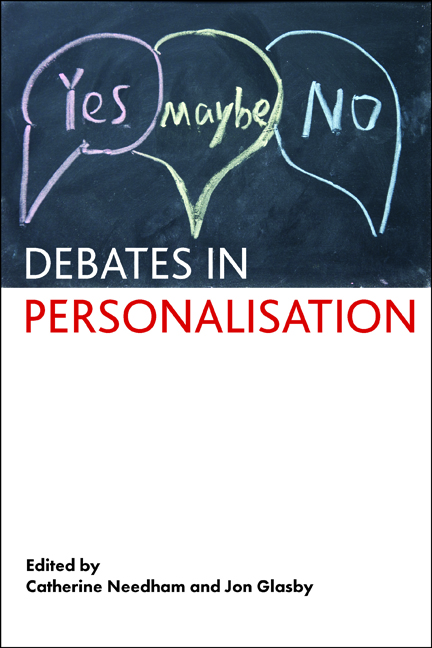Book contents
three - Making it real: from Putting People First to Think Local, Act Personal
Published online by Cambridge University Press: 04 March 2022
Summary
This chapter is a critical examination of the core government personalisation policy documents – Putting People First (DH, 2007) and Think Local, Act Personal (TLAP, 2011b) – and how the proposals were influenced by broader strategies for welfare reform. It analyses the policy documents across changing ideological standpoints following the 2010 change of government from New Labour to a Conservative-dominated coalition with the Liberal Democrats. The intention is not to assess the implementation of all the personalisation policy reforms set out in the key government documents, but rather to examine the documents as artefacts of the broader welfare and public policy reform ideologies of the different administrations. In this way it is possible to explore how some of the wider government public sector reform strategies have shaped personalisation implementation proposals. The methodology is informed by a documentary analysis approach. This exploration of key personalisation policy documents highlights how they bear the hallmarks of wider welfare reform approaches in both administrations and draws on critical perspectives offered by selected academics. The analysis draws on research-based explorations of the ‘modernisation’ and ‘transformation’ reform agendas in adult social care (Newman et al, 2008), refers to a critique of joined-up government (Pollitt, 2003) and traces adult social care policy evolution (Means, 2012). Evidence is drawn from findings from the individual budgets (IB) pilot evaluation (Glendinning et al, 2011; Moran et al, 2011).
Policy evolution
Means (2012) offers a helpful historical perspective for contexualising personalisation reforms in adult social care. He sees the agenda as belonging within a historical continuum of policy development, where major themes about funding, quality, provision, access and defining social care continually re-emerge as challenges. Means argues that ‘it needs to be remembered that the Griffiths Report is now over 20 years old and in many ways it set out the personalisation agenda which the coalition government now intends to implement’ (2012, p 317). The 2007 Putting People First policy concordat refers back to the Community Care reforms instigated by Griffiths and the initial coalition adult social care reform document refers to the 1968 Seebohm Report, again highlighting the evolutionary nature of the policy.
- Type
- Chapter
- Information
- Debates in Personalisation , pp. 25 - 34Publisher: Bristol University PressPrint publication year: 2014



